
- 阻害剤
- 研究分野別
- PI3K/Akt/mTOR
- Epigenetics
- Methylation
- Immunology & Inflammation
- Protein Tyrosine Kinase
- Angiogenesis
- Apoptosis
- Autophagy
- ER stress & UPR
- JAK/STAT
- MAPK
- Cytoskeletal Signaling
- Cell Cycle
- TGF-beta/Smad
- 化合物ライブラリー
- Popular Compound Libraries
- Customize Library
- Clinical and FDA-approved Related
- Bioactive Compound Libraries
- Inhibitor Related
- Natural Product Related
- Metabolism Related
- Cell Death Related
- By Signaling Pathway
- By Disease
- Anti-infection and Antiviral Related
- Neuronal and Immunology Related
- Fragment and Covalent Related
- FDA-approved Drug Library
- FDA-approved & Passed Phase I Drug Library
- Preclinical/Clinical Compound Library
- Bioactive Compound Library-I
- Bioactive Compound Library-II
- Kinase Inhibitor Library
- Express-Pick Library
- Natural Product Library
- Human Endogenous Metabolite Compound Library
- Alkaloid Compound LibraryNew
- Angiogenesis Related compound Library
- Anti-Aging Compound Library
- Anti-alzheimer Disease Compound Library
- Antibiotics compound Library
- Anti-cancer Compound Library
- Anti-cancer Compound Library-Ⅱ
- Anti-cancer Metabolism Compound Library
- Anti-Cardiovascular Disease Compound Library
- Anti-diabetic Compound Library
- Anti-infection Compound Library
- Antioxidant Compound Library
- Anti-parasitic Compound Library
- Antiviral Compound Library
- Apoptosis Compound Library
- Autophagy Compound Library
- Calcium Channel Blocker LibraryNew
- Cambridge Cancer Compound Library
- Carbohydrate Metabolism Compound LibraryNew
- Cell Cycle compound library
- CNS-Penetrant Compound Library
- Covalent Inhibitor Library
- Cytokine Inhibitor LibraryNew
- Cytoskeletal Signaling Pathway Compound Library
- DNA Damage/DNA Repair compound Library
- Drug-like Compound Library
- Endoplasmic Reticulum Stress Compound Library
- Epigenetics Compound Library
- Exosome Secretion Related Compound LibraryNew
- FDA-approved Anticancer Drug LibraryNew
- Ferroptosis Compound Library
- Flavonoid Compound Library
- Fragment Library
- Glutamine Metabolism Compound Library
- Glycolysis Compound Library
- GPCR Compound Library
- Gut Microbial Metabolite Library
- HIF-1 Signaling Pathway Compound Library
- Highly Selective Inhibitor Library
- Histone modification compound library
- HTS Library for Drug Discovery
- Human Hormone Related Compound LibraryNew
- Human Transcription Factor Compound LibraryNew
- Immunology/Inflammation Compound Library
- Inhibitor Library
- Ion Channel Ligand Library
- JAK/STAT compound library
- Lipid Metabolism Compound LibraryNew
- Macrocyclic Compound Library
- MAPK Inhibitor Library
- Medicine Food Homology Compound Library
- Metabolism Compound Library
- Methylation Compound Library
- Mouse Metabolite Compound LibraryNew
- Natural Organic Compound Library
- Neuronal Signaling Compound Library
- NF-κB Signaling Compound Library
- Nucleoside Analogue Library
- Obesity Compound Library
- Oxidative Stress Compound LibraryNew
- Phenotypic Screening Library
- PI3K/Akt Inhibitor Library
- Protease Inhibitor Library
- Protein-protein Interaction Inhibitor Library
- Pyroptosis Compound Library
- Small Molecule Immuno-Oncology Compound Library
- Mitochondria-Targeted Compound LibraryNew
- Stem Cell Differentiation Compound LibraryNew
- Stem Cell Signaling Compound Library
- Natural Phenol Compound LibraryNew
- Natural Terpenoid Compound LibraryNew
- TGF-beta/Smad compound library
- Traditional Chinese Medicine Library
- Tyrosine Kinase Inhibitor Library
- Ubiquitination Compound Library
-
Cherry Picking
You can personalize your library with chemicals from within Selleck's inventory. Build the right library for your research endeavors by choosing from compounds in all of our available libraries.
Please contact us at info@selleck.co.jp to customize your library.
You could select:
- 抗体
- 新製品
- お問い合わせ
FGFR
FGFR製品
- All (68)
- FGFR阻害剤 (57)
- FGFR抗体(8)
- FGFR活性剤(1)
- 新製品
| 製品コード | 製品名称 | 製品説明 | 文献中Selleckの製品使用例 | お客様のフィードバック |
|---|---|---|---|---|
| S1040 | Sorafenib tosylate | Sorafenib tosylate is a multikinase inhibitor of Raf-1 and B-Raf with IC50 of 6 nM and 22 nM in cell-free assays, respectively. Sorafenib Tosylate inhibits VEGFR-2, VEGFR-3, PDGFR-β, Flt-3 and c-KIT with IC50 of 90 nM, 20 nM, 57 nM, 59 nM and 68 nM, respectively. Sorafenib Tosylate induces autophagy and apoptosis and activates ferroptosis with anti-tumor activity. |
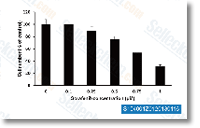
|
|
| S2183 | Infigratinib (BGJ398) | Infigratinib (BGJ398) is a potent and selective FGFR inhibitor for FGFR1/2/3 with IC50 of 0.9 nM/1.4 nM/1 nM in cell-free assays, >40-fold selective for FGFR versus FGFR4 and VEGFR2, and little activity to Abl, Fyn, Kit, Lck, Lyn and Yes. Phase 2. |
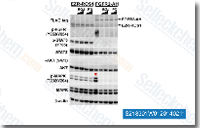
|
|
| S1490 | Ponatinib (AP24534) | Ponatinib is a novel, potent multi-target inhibitor of Abl, PDGFRα, VEGFR2, FGFR1 and Src with IC50 of 0.37 nM, 1.1 nM, 1.5 nM, 2.2 nM and 5.4 nM in cell-free assays, respectively. Ponatinib (AP24534) inhibits autophagy. |
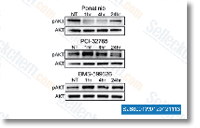
|
|
| S1010 | Nintedanib (BIBF 1120) | Nintedanib is a potent triple angiokinase inhibitor for VEGFR1/2/3, FGFR1/2/3 and PDGFRα/β with IC50 of 34 nM/13 nM/13 nM, 69 nM/37 nM/108 nM and 59 nM/65 nM in cell-free assays. Phase 3. |
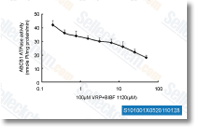
|
|
| S2801 | Fexagratinib (AZD4547) | Fexagratinib (AZD4547,ABSK 091) is a novel selective FGFR inhibitor targeting FGFR1/2/3 with IC50 of 0.2 nM/2.5 nM/1.8 nM in cell-free assays, weaker activity against FGFR4, VEGFR2(KDR), and little activity observed against IGFR, CDK2, and p38. Phase 2/3. |
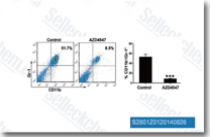
|
|
| S1264 | PD173074 | PD173074 is a potent FGFR1 inhibitor with IC50 of ~25 nM and also inhibits VEGFR2 with IC50 of 100-200 nM in cell-free assays, ~1000-fold selective for FGFR1 than PDGFR and c-Src. PD173074 reduces proliferation and promotes apoptosis in gastric cancer cells. |
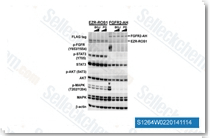
|
|
| S1164 | Lenvatinib (E7080) | レンバチニブ (Lenvatinib (E7080)) はマルチターゲット阻害剤の一種であり、主に VEGFR2(KDR)/VEGFR3(Flt-4) に対して活性を示し IC50 は 4 nM/5.2 nMである一方、VEGFR1/Flt-1に対しては活性が弱く、cell-free assay において FGFR1, PDGFRα/βよりも VEGFR2/3 に対して 10 倍高い選択性を示します。レンバチニブ (E7080) はまた FGFR1-4, PDGFR, Kit (c-Kit), RET (c-RET) も阻害し、強力な抗腫瘍活性を呈します。 |
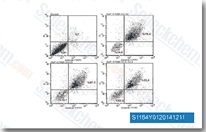
|
|
| S3012 | Pazopanib | Pazopanib (GW786034) is a novel multi-target inhibitor of VEGFR1, VEGFR2, VEGFR3, PDGFR, FGFR, c-Kit and c-Fms/CSF1R with IC50 of 10 nM, 30 nM, 47 nM, 84 nM, 74 nM, 140 nM and 146 nM in cell-free assays, respectively. Pazopanib induces cathepsin B activation and autophagy. |
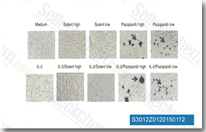
|
|
| S1035 | Pazopanib HCl | Pazopanib HCl is a novel multi-target inhibitor of VEGFR1, VEGFR2, VEGFR3, PDGFR, FGFR, c-Kit and c-Fms with IC50 of 10 nM, 30 nM, 47 nM, 84 nM, 74 nM, 140 nM and 146 nM in cell-free assays, respectively. Pazopanib induces autophagic Type II cell death. |
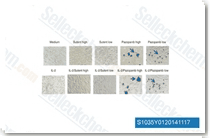
|
|
| S1018 | Dovitinib (TKI-258) | Dovitinib (TKI258, CHIR258) is a multitargeted RTK inhibitor, mostly for class III (FLT3/c-Kit) with IC50 of 1 nM/2 nM, also potent to class IV (FGFR1/3) and class V (VEGFR1-4) RTKs with IC50 of 8-13 nM, less potent to InsR, EGFR, c-Met, EphA2, Tie2, IGF-1R and HER2 in cell-free assays. Phase 4. |
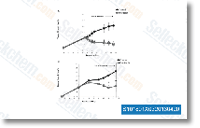
|
|
| S1107 | Danusertib (PHA-739358) | Danusertib (PHA-739358) is an Aurora kinase inhibitor for Aurora A/B/C with IC50 of 13 nM/79 nM/61 nM in cell-free assays, modestly potent to Abl, TrkA, c-RET and FGFR1, and less potent to Lck, VEGFR2/3, c-Kit, CDK2, etc. Danusertib induces apoptosis, cell cycle arrest, and autophagy. Phase 2. |
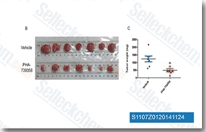
|
|
| S8401 | Erdafitinib (JNJ-42756493) | Erdafitinib is a potent and selective orally bioavailable, pan fibroblast growth factor receptor (FGFR) inhibitor with potential antineoplastic activity. Erdafitinib also binds to RET (c-RET), CSF-1R, PDGFR-α/PDGFR-β, FLT4, Kit (c-Kit) and VEGFR-2 and induces cellular apoptosis. |
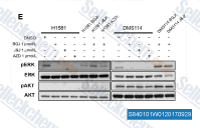
|
|
| S7765 | Dovitinib (TKI258) Lactate monohydrate | Dovitinib (TKI258) Lactate monohydrate is the Lactate of Dovitinib, which is a multitargeted RTK inhibitor, mostly for class III (FLT3/c-Kit) with IC50 of 1 nM/2 nM, also potent to class IV (FGFR1/3) and class V (VEGFR1-4) RTKs with IC50 of 8-13 nM, less potent to InsR, EGFR, c-Met, EphA2, Tie2, IGFR1 and HER2. Phase 4. |
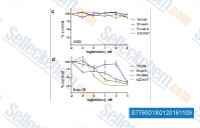
|
|
| S5240 | Lenvatinib Mesylate | Lenvatinib Mesylate is a synthetic, orally available tyrosine kinase inhibitor that inhibits vascular endothelial growth factor receptor (VEGFR1-3), fibroblast growth factor receptor (FGFR1-4), platelet-derived growth factor receptor α (PDGFRα), stem cell factor receptor (Kit (c-Kit)), and rearranged during transfection (RET (c-RET)). Lenvatinib Mesylate has potential antineoplastic activity. | ||
| S7819 | BLU9931 | BLU9931 is a potent, selective, and irreversible FGFR4 inhibitor with IC50 of 3 nM, about 297-, 184-, and 50-fold selectivity over FGFR1/2/3, respectively. |
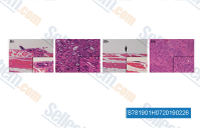
|
|
| S7057 | LY2874455 | LY2874455 is a pan-FGFR inhibitor with IC50 of 2.8 nM, 2.6 nM, 6.4 nM, and 6 nM for FGFR1, FGFR2, FGFR3, and FGFR4, respectively, and also inhibits VEGFR2 activity with IC50 of 7 nM. Phase 1. |
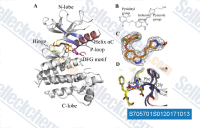
|
|
| S5234 | Nintedanib Ethanesulfonate Salt | Nintedanib (Intedanib, BIBF 1120) is a small molecule tyrosine-kinase inhibitor with IC50 of 34 nM/13 nM/13 nM, 69 nM/37 nM/108 nM and 59 nM/65 nM for VEGFR1/2/3, FGFR1/2/3 and PDGFRα/β, respectively. | ||
| S7667 | SU5402 | SU5402 is a potent multi-targeted receptor tyrosine kinase inhibitor with IC50 of 20 nM, 30 nM, and 510 nM for VEGFR2, FGFR1, and PDGF-Rβ, respectively. |
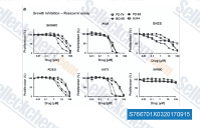
|
|
| S8024 | Tyrphostin AG 1296 | Tyrphostin AG 1296 is an inhibitor of PDGFR with IC50 of 0.3-0.5 μM, no activity to EGFR. Tyrphostin AG1296 inhibits FGFR and c-Kit with IC50 of 12.3 μM and 1.8 μM in Swiss 3T3 cells. Tyrphostin AG1296 induces dramatic apoptosis in A375R cells. |
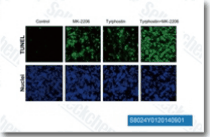
|
|
| S0088 | Pemigatinib (INCB054828) | Pemigatinib is an orally active and selective inhibitor of FGFR with IC50 of 0.4 nM, 0.5 nM, 1.2 nM and 30 nM for FGFR1, FGFR2, FGFR3 and FGFR4, respectively. Pemigatinib has the potential for cholangiocarcinoma. | ||
| S7665 | Zoligratinib (Debio-1347) | Zoligratinib (Debio-1347, CH5183284, FF284) is a selective and orally available FGFR inhibitor with IC50 of 9.3 nM, 7.6 nM, 22 nM, and 290 nM for FGFR1, FGFR2, FGFR3, and FGFR4, respectively. Phase 1. | ||
| S1084 | Brivanib (BMS-540215) | Brivanib is an ATP-competitive inhibitor against VEGFR2 with IC50 of 25 nM, moderate potency against VEGFR-1 and FGFR-1, but >240-fold against PDGFR-β. Phase 3. |
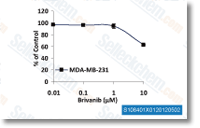
|
|
| S8848 | Futibatinib (TAS-120) | Futibatinib (TAS-120) is an irreversible fibroblast growth factor receptor (FGFR) inhibitor which inhibits all 4 subtypes of FGFR with enzyme IC50 values of 1.8 nM, 1.4 nM, 1.6 nM and 3.7 nM for FGFR1, FGFR2, FGFR3 and FGFR4, respectively. | ||
| S1181 | ENMD-2076 | ENMD-2076 has selective activity against Aurora A and Flt3 with IC50 of 14 nM and 1.86 nM, 25-fold selective for Aurora A than over Aurora B and less potent to RET, SRC, NTRK1/TRKA, CSF1R/FMS, VEGFR2/KDR, FGFR and PDGFRα. ENMD-2076 inhibits the growth of a wide range of human solid tumor and hematopoietic cancer cell lines with IC50 from 0.025 to 0.7 μM, which induces apoptosis and G2/M phase arrest. Phase 2. |
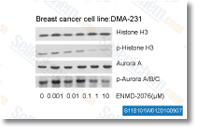
|
|
| S8493 | PD-166866 | PD-166866 is a synthetic molecule inhibiting the tyrosin kinase action of FGFR1, shows a very high selectivity towards FGFR1 and inhibits the auto-phosphorylation activity of FGRF1. | ||
| S7167 | SSR128129E | SSR128129E is an orally-active and allosteric FGFR1 inhibitor with IC50 of 1.9 μM, while not affecting other related RTKs. |
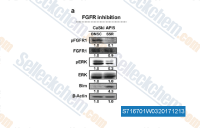
|
|
| S8675 | H3B-6527 | H3B-6527 is a highly selective covalent FGFR4 inhibitor with an IC50 value of <1.2 nM and at least 250-fold selectivity over FGFR1-3 (IC50 values of 320, 1,290 and 1,060 nM respectively). |
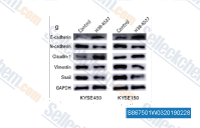
|
|
| S8503 | Fisogatinib (BLU-554) | Fisogatinib (BLU-554) is a potent, highly-selective, oral FGFR4 inhibitor with an IC50 value of 5 nM. The IC50s for FGFR1-3 is 624-2203 nM. | ||
| S8609 | Derazantinib | Derazantinib is an orally bioavailable inhibitor of the fibroblast growth factor receptor (FGFR) with IC50 values of 1.8 nM for FGFR2, and 4.5 nM for FGFR1 and 3, showing lower potency for FGFR4 (IC50=34 nM). It also inhibits RET, DDR2, PDGFRβ, VEGFR and KIT. | ||
| S7714 | FIIN-2 | FIIN-2 is an irreversible, pan-FGFR inhibitor with IC50 of 3.09 nM, 4.3 nM, 27 nM and 45.3 nM for FGFR1/2/3/4, respectively. | ||
| S2774 | MK-2461 | MK-2461 is a potent, multi-targeted inhibitor for c-Met(WT/mutants) with IC50 of 0.4-2.5 nM, less potent to Ron, Flt1; 8- to 30-fold greater selectivity of c-Met targets versus FGFR1, FGFR2, FGFR3, PDGFRβ, KDR, Flt3, Flt4, TrkA, and TrkB. Phase 1/2. . |
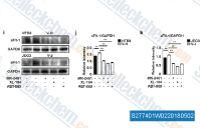
|
|
| S2300 | Ferulic Acid | Ferulic Acid (Fumalic) is a hydroxycinnamic acid and a type of organic compound found in the Ferula assafoetida L. or Ligusticum chuanxiong. Ferulic acid is a novel fibroblast growth factor receptor (FGFR) inhibitor with IC50s of 3.78 μM and 12.5 μM for FGFR1 and FGFR2, respectively. | ||
| S6539 | ASP5878 | ASP5878 is a novel FGFR-selective inhibitor with IC50 values of 0.47, 0.60, 0.74, and 3.5 nmol/L for recombinant FGFR1, 2, 3, and 4, respectively. | ||
| S8548 | Roblitinib (FGF401) | FGF401 is an FGFR4-selective inhibitor with an IC50 of 1.9 nM. It binds in a reversible covalent manner to the FGFR4 kinase domain and shows at least 1,000 fold selectivity against of panel of 65 kinases in biochemical assays. | ||
| S1138 | Brivanib Alaninate (BMS-582664) | Brivanib alaninate (BMS-582664) is the prodrug of BMS-540215, an ATP-competitive inhibitor against VEGFR2 with IC50 of 25 nM. |

|
|
| S8754 | Alofanib (RPT835) | Alofanib (RPT835) is a novel selective allosteric inhibitor of FGFR2 and has a dramatic inhibitory effect with IC50 <10 nM on FGF2-induced phoshphorylation of FRS2a in KATO III cells. It has no direct effect on FGF2-dependent FGFR1 and FGFR3 phosphorylation levels in either cell lines and no effects on FGF2-FGFR2 binding. | ||
| S6526 | SKLB 610 | SKLB-610 is a multi-target inhibitor of the tyrosine kinases. It is most potent against VEGFR2 and exhibits slightly weaker inhibitor of FGFR2 and PDGFR. | ||
| S8161 | ON123300 | ON123300 is a potent and multi-targeted kinase inhibitor with IC50 of 3.9 nM, 5 nM, 26 nM, 26 nM, 9.2 nM and 11nM for CDK4, Ark5/NUAK1, PDGFRβ, FGFR1, RET (c-RET), and Fyn, respectively. | ||
| S7940 | NSC12 | NSC12 (NSC 172285) is an orally available pan-FGF trap able to inhibit FGF2/FGFR interaction and endowed with promising antitumor activity. | ||
| S8404 | S49076 | S49076 is a novel, potent inhibitor of Met (c-Met), AXL/MER, and FGFR1/2/3 with IC50 values below 20 nmol/L. | ||
| S8578 | PRN1371 | PRN1371 is an irreversible covalent FGFR1-4 kinase inhibitor, with IC50s of 0.6, 1.3, 4.1, 19.3 and 8.1 nM for FGFR1, 2, 3, 4 and CSF1R, respectively. | ||
| S0487 | Sulfatinib | Sulfatinib is a potent and highly selective tyrosine kinase inhibitor against VEGFR1, VEGFR2, VEGFR3, FGFR1 and CSF1R with IC50 of 2 nM, 24 nM, 1 nM, 15 nM and 4 nM, respectively. Sulfatinib shows encouraging antitumor activity and manageable toxicities in patients with advanced NETs. | ||
| F0331 | FGF Receptor 1 Antibody [C5C14] | |||
| F0779 | FGF Receptor 2 Antibody [C16A22] | FGF Receptor 2 Rabbit mAb recognizes endogenous levels of total FGFR2 protein and does not cross-react with FGFR1 or FGFR4. | ||
| S8882 | ODM-203 | ODM-203 is a selective inhibitor of FGFR and VEGFR with ic50s of 11 nM,16 nM,6 nM, 35 nM,26 nM,9 nM,5 nM for recombinant FGFR1, FGFR2, FGFR3,FGFR4, VEGFR1, VEGFR2 and VEGFR3, respectively. | ||
| E1757New | Gunagratinib | Gunagratinib (ICP-192) is a pan-FGFR (fibroblast growth factor receptors) inhibitor with IC50 of 1.4, 1.5, 2.4 and 3.5 nM for FGFR1-4, respectively. It has the potential to treat advanced solid tumors. | ||
| E4474 | Infigratinib Phosphate | Infigratinib Phosphate (NVP-BGJ398 phosphate) is the phosphate salt form of infigratinib, an orally bioavailable pan-inhibitor of human fibroblast growth factor receptors (FGFRs) with IC50 of 0.9 nM, 1.4 nM, 1 nM, and 60 nM for FGFR1, FGFR2, FGFR3, and FGFR4 respectively. It also has potential antiangiogenic, antineoplastic and antitumor activities. | ||
| E2656 | R1530 | R1530 is a highly potent, orally bioavailable, dual-acting mitosis/angiogenesis inhibitor for the treatment of solid tumors, which can inhibit vascular endothelial growth factor receptor 2 (VEGFR2) and fibroblast growth factor receptors 1 (FGFR1) with IC50s of 10 nM and 28 nM, respectively. | ||
| A2653 | Anti-FGF19 (1A6) | Anti-FGF19 (1A6) is a humanized monoclonal antibody that specifically targets FGF19. It has antitumoe activities and can used in the treatment of hepatocellular carcinoma (HCC). MW :145.2 KD. | ||
| A2909 | Anti-FGFR1 / CD331 | Anti-FGFR1 / CD331 is a monoclonal antibody againts human fibroblast growth factor receptor 1. MW: 150 KD. | ||
| S7647 | Lucitanib (E3810) hydrochloride | Lucitanib (E-3810, AL3810) hydrochloride is a dual inhibitor of Vascular endothelial growth factor receptor (VEGFR) and Fibroblast growth factor receptor (FGFR). Lucitanib hydrochloride (E-3810, AL3810) potently and selectively inhibits VEGFR1, VEGFR2, VEGFR3, FGFR1 and FGFR2 with IC50 of 7 nM, 25 nM, 10 nM, 17.5 nM, and 82.5 nM, respectively. | ||
| S9031 | Gambogenic acid | Gambogenic Acid, identified from Gamboge, is an inhibitor of the FGFR signaling pathway in erlotinib-resistant non-small-cell lung cancer (NSCLC) and exhibits anti-tumor effects. Gambogenic acid acts is also an effective inhibitor of EZH2 that specifically and covalently binds to Cys668 within the EZH2-SET domain, and triggers EZH2 ubiquitination. | ||
| A2494 | Anti-FGFR4 / CD334 | Anti-FGFR4 / CD334 (U3-1784) is a human monoclonal antibody targeting FGFR4 (human fibroblast growth factor receptor 4), with potential antineoplastic activity. It blocks activation of FGFR4, which inhibits FGFR4-mediated signaling and leads to an inhibition of cell proliferation in FGFR4-overexpressing tumor cells. MW: 145.5 KD. | ||
| S8547 | Rogaratinib | Rogaratinib(BAY-1163877) is a highly potent and selective small molecule inhibitor of pan‐FGFR kinase activity, which specifically inhibits FGFR1, 2, 3 and 4 with an IC50 values of 1.8 nM, <1 nM, 9.2 nM and 1.2 nM respectively. It demonstrates robust efficacy in cancers with altered FGFR mRNA expression. | ||
| A2495 | Vofatamab (Anti-FGFR3 / CD333) | Vofatamab (Anti-FGFR3 / CD333) is a monoclonal antibody targeting FGFR3. Vofatamab blocks activation of both the wildtype and genetically activated receptor. Vofatamab can be used in the research of metastatic urothelial carcinoma (mUC). MW: 145.5 KD. | ||
| A2496 | Anti-FGFR3 / CD333 | Anti-FGFR3 / CD333 (LY3076226) is a human monoclonal antibody targeting FGFR3 (fibroblast growth factor receptor type 3). MW: 145.5 KD. | ||
| A2497 | Bemarituzumab (Anti-FGFR2 / CD332) | Bemarituzumab (Anti-FGFR2 / CD332) is a first-in-class, humanized IgG1 monoclonal antibody against FGFR2b (a FGF receptor). Bemarituzumab blocks fibroblast growth factors from binding and activating FGFR2b. Bemarituzumab has the potential for cancer research. MW: 145.24 KD. |
.gif)
|
|
| A2498 | Aprutumab (Anti-FGFR2 / CD332) | Aprutumab (Anti-FGFR2 / CD332) is a fully human FGFR2 monoclonal antibody, which binds to the FGFR2 isoforms FGFR2-IIIb and FGFR2-IIIc. Aprutumab has the potential for solid tumors research. MW: 78.2 KD. | ||
| A2499 | Burosumab (Anti-FGF23) | Burosumab (Anti-FGF23) is a neutralizing antibody, targeting human fibroblast growth factor 23 (FGF23). It can be used for the research of X-linked hypophosphatemia (XLH) and tumor-induced osteomalacia. MW: 145.5 KD. | ||
| E1979 | Irpagratinib | Irpagratinib (ABSK011) is a potent inhibitor of FGFR4 with an IC50 of < 10 nM in biochemical assays. It effectively suppresses FGFR4 auto-phosphorylation and disrupts downstream signal transduction. It also strongly inhibits tumor growth and induces regression in subcutaneous xenograft models. | ||
| S8192 | SUN11602 | SUN11602 is a small synthetic compound that mimics the neuroprotective activities of bFGF and activates key molecules in the FGF receptor-1-mitogen-activated protein kinase/extracellular signal-regulated kinase-1/2 kinase (FGFR-1-MEK/ERK) signaling pathway. | ||
| E0814 | Masitinib mesylate | Masitinib mesylate (AB-1010 mesylate) is a potent, orally bioavailable, and selective inhibitor of c-Kit with IC50 of 200 nM for human recombinant c-Kit, also inhibits PDGFRα/β with IC50s of 540/800 nM, Lyn with IC50 of 510 nM for LynB, and, to a lesser extent, FGFR3 and FAK. | ||
| E1814 | Resigratinib | Resigratinib (KIN-3248) is a potent, kinome selective, irreversible, orally bioavailable, small-molecule inhibitor of pan-FGFR. It exhibits dose-dependent tumor inhibition in FGFR driven cholangiocarcinoma, gastric, and bladder cancer xenograft models. | ||
| E4727New | TYRA-300 | TYRA-300 , a 3-pyridylindazole analog, is a reversible and selective inhibitor of FGFR3 with an IC50 of 11 nM in Ba/F3 cells. It also exhibit potent activity in human bladder cancer cell lines harboring FGFR3 activating fusions or mutations. | ||
| S8965 | BO-264 | BO-264 is a potent and orally active inhibitor of transforming acidic coiled-coil 3 (TACC3) with IC50 of 188 nM and Kd of 1.5 nM. BO-264 specifically blocks the function of FGFR3-TACC3 fusion protein. BO-264 induces SAC-dependent mitotic arrest, apoptosis and DNA damage with antitumor activities. | ||
| E1431 | Lirafugratinib | Lirafugratinib (RLY-4008) is an orally active and selective inhibitor of FGFR2. | ||
| S7715 | FIIN-3 | FIIN-3 is an irreversible inhibitor of FGFR with an IC50 of 13.1, 21, 31.4, and 35.3 nM for FGFR1, FGFR2, FGFR3 and FGFR4, respectively. | ||
| E1435 | Tinengotinib | Tinengotinib (TT-00420) is a novel multiple kinase inhibitor that strongly inhibits Aurora A/B with IC50 values of 1.2/3.3 nM respectively. It also exhibits potent inhibitory activity on FGFR1/2/3, VEGFR1, JAK1/2, and CSF1R and can be used to treat several prominent signaling pathways in triple-negative breast cancer(TNBC). | ||
| S1040 | Sorafenib tosylate | Sorafenib tosylate is a multikinase inhibitor of Raf-1 and B-Raf with IC50 of 6 nM and 22 nM in cell-free assays, respectively. Sorafenib Tosylate inhibits VEGFR-2, VEGFR-3, PDGFR-β, Flt-3 and c-KIT with IC50 of 90 nM, 20 nM, 57 nM, 59 nM and 68 nM, respectively. Sorafenib Tosylate induces autophagy and apoptosis and activates ferroptosis with anti-tumor activity. |

|
|
| S2183 | Infigratinib (BGJ398) | Infigratinib (BGJ398) is a potent and selective FGFR inhibitor for FGFR1/2/3 with IC50 of 0.9 nM/1.4 nM/1 nM in cell-free assays, >40-fold selective for FGFR versus FGFR4 and VEGFR2, and little activity to Abl, Fyn, Kit, Lck, Lyn and Yes. Phase 2. |

|
|
| S1490 | Ponatinib (AP24534) | Ponatinib is a novel, potent multi-target inhibitor of Abl, PDGFRα, VEGFR2, FGFR1 and Src with IC50 of 0.37 nM, 1.1 nM, 1.5 nM, 2.2 nM and 5.4 nM in cell-free assays, respectively. Ponatinib (AP24534) inhibits autophagy. |

|
|
| S1010 | Nintedanib (BIBF 1120) | Nintedanib is a potent triple angiokinase inhibitor for VEGFR1/2/3, FGFR1/2/3 and PDGFRα/β with IC50 of 34 nM/13 nM/13 nM, 69 nM/37 nM/108 nM and 59 nM/65 nM in cell-free assays. Phase 3. |

|
|
| S2801 | Fexagratinib (AZD4547) | Fexagratinib (AZD4547,ABSK 091) is a novel selective FGFR inhibitor targeting FGFR1/2/3 with IC50 of 0.2 nM/2.5 nM/1.8 nM in cell-free assays, weaker activity against FGFR4, VEGFR2(KDR), and little activity observed against IGFR, CDK2, and p38. Phase 2/3. |

|
|
| S1264 | PD173074 | PD173074 is a potent FGFR1 inhibitor with IC50 of ~25 nM and also inhibits VEGFR2 with IC50 of 100-200 nM in cell-free assays, ~1000-fold selective for FGFR1 than PDGFR and c-Src. PD173074 reduces proliferation and promotes apoptosis in gastric cancer cells. |

|
|
| S1164 | Lenvatinib (E7080) | レンバチニブ (Lenvatinib (E7080)) はマルチターゲット阻害剤の一種であり、主に VEGFR2(KDR)/VEGFR3(Flt-4) に対して活性を示し IC50 は 4 nM/5.2 nMである一方、VEGFR1/Flt-1に対しては活性が弱く、cell-free assay において FGFR1, PDGFRα/βよりも VEGFR2/3 に対して 10 倍高い選択性を示します。レンバチニブ (E7080) はまた FGFR1-4, PDGFR, Kit (c-Kit), RET (c-RET) も阻害し、強力な抗腫瘍活性を呈します。 |

|
|
| S3012 | Pazopanib | Pazopanib (GW786034) is a novel multi-target inhibitor of VEGFR1, VEGFR2, VEGFR3, PDGFR, FGFR, c-Kit and c-Fms/CSF1R with IC50 of 10 nM, 30 nM, 47 nM, 84 nM, 74 nM, 140 nM and 146 nM in cell-free assays, respectively. Pazopanib induces cathepsin B activation and autophagy. |

|
|
| S1035 | Pazopanib HCl | Pazopanib HCl is a novel multi-target inhibitor of VEGFR1, VEGFR2, VEGFR3, PDGFR, FGFR, c-Kit and c-Fms with IC50 of 10 nM, 30 nM, 47 nM, 84 nM, 74 nM, 140 nM and 146 nM in cell-free assays, respectively. Pazopanib induces autophagic Type II cell death. |

|
|
| S1018 | Dovitinib (TKI-258) | Dovitinib (TKI258, CHIR258) is a multitargeted RTK inhibitor, mostly for class III (FLT3/c-Kit) with IC50 of 1 nM/2 nM, also potent to class IV (FGFR1/3) and class V (VEGFR1-4) RTKs with IC50 of 8-13 nM, less potent to InsR, EGFR, c-Met, EphA2, Tie2, IGF-1R and HER2 in cell-free assays. Phase 4. |

|
|
| S1107 | Danusertib (PHA-739358) | Danusertib (PHA-739358) is an Aurora kinase inhibitor for Aurora A/B/C with IC50 of 13 nM/79 nM/61 nM in cell-free assays, modestly potent to Abl, TrkA, c-RET and FGFR1, and less potent to Lck, VEGFR2/3, c-Kit, CDK2, etc. Danusertib induces apoptosis, cell cycle arrest, and autophagy. Phase 2. |

|
|
| S8401 | Erdafitinib (JNJ-42756493) | Erdafitinib is a potent and selective orally bioavailable, pan fibroblast growth factor receptor (FGFR) inhibitor with potential antineoplastic activity. Erdafitinib also binds to RET (c-RET), CSF-1R, PDGFR-α/PDGFR-β, FLT4, Kit (c-Kit) and VEGFR-2 and induces cellular apoptosis. |

|
|
| S7765 | Dovitinib (TKI258) Lactate monohydrate | Dovitinib (TKI258) Lactate monohydrate is the Lactate of Dovitinib, which is a multitargeted RTK inhibitor, mostly for class III (FLT3/c-Kit) with IC50 of 1 nM/2 nM, also potent to class IV (FGFR1/3) and class V (VEGFR1-4) RTKs with IC50 of 8-13 nM, less potent to InsR, EGFR, c-Met, EphA2, Tie2, IGFR1 and HER2. Phase 4. |

|
|
| S5240 | Lenvatinib Mesylate | Lenvatinib Mesylate is a synthetic, orally available tyrosine kinase inhibitor that inhibits vascular endothelial growth factor receptor (VEGFR1-3), fibroblast growth factor receptor (FGFR1-4), platelet-derived growth factor receptor α (PDGFRα), stem cell factor receptor (Kit (c-Kit)), and rearranged during transfection (RET (c-RET)). Lenvatinib Mesylate has potential antineoplastic activity. | ||
| S7819 | BLU9931 | BLU9931 is a potent, selective, and irreversible FGFR4 inhibitor with IC50 of 3 nM, about 297-, 184-, and 50-fold selectivity over FGFR1/2/3, respectively. |

|
|
| S7057 | LY2874455 | LY2874455 is a pan-FGFR inhibitor with IC50 of 2.8 nM, 2.6 nM, 6.4 nM, and 6 nM for FGFR1, FGFR2, FGFR3, and FGFR4, respectively, and also inhibits VEGFR2 activity with IC50 of 7 nM. Phase 1. |

|
|
| S5234 | Nintedanib Ethanesulfonate Salt | Nintedanib (Intedanib, BIBF 1120) is a small molecule tyrosine-kinase inhibitor with IC50 of 34 nM/13 nM/13 nM, 69 nM/37 nM/108 nM and 59 nM/65 nM for VEGFR1/2/3, FGFR1/2/3 and PDGFRα/β, respectively. | ||
| S7667 | SU5402 | SU5402 is a potent multi-targeted receptor tyrosine kinase inhibitor with IC50 of 20 nM, 30 nM, and 510 nM for VEGFR2, FGFR1, and PDGF-Rβ, respectively. |

|
|
| S8024 | Tyrphostin AG 1296 | Tyrphostin AG 1296 is an inhibitor of PDGFR with IC50 of 0.3-0.5 μM, no activity to EGFR. Tyrphostin AG1296 inhibits FGFR and c-Kit with IC50 of 12.3 μM and 1.8 μM in Swiss 3T3 cells. Tyrphostin AG1296 induces dramatic apoptosis in A375R cells. |

|
|
| S0088 | Pemigatinib (INCB054828) | Pemigatinib is an orally active and selective inhibitor of FGFR with IC50 of 0.4 nM, 0.5 nM, 1.2 nM and 30 nM for FGFR1, FGFR2, FGFR3 and FGFR4, respectively. Pemigatinib has the potential for cholangiocarcinoma. | ||
| S7665 | Zoligratinib (Debio-1347) | Zoligratinib (Debio-1347, CH5183284, FF284) is a selective and orally available FGFR inhibitor with IC50 of 9.3 nM, 7.6 nM, 22 nM, and 290 nM for FGFR1, FGFR2, FGFR3, and FGFR4, respectively. Phase 1. | ||
| S1084 | Brivanib (BMS-540215) | Brivanib is an ATP-competitive inhibitor against VEGFR2 with IC50 of 25 nM, moderate potency against VEGFR-1 and FGFR-1, but >240-fold against PDGFR-β. Phase 3. |

|
|
| S8848 | Futibatinib (TAS-120) | Futibatinib (TAS-120) is an irreversible fibroblast growth factor receptor (FGFR) inhibitor which inhibits all 4 subtypes of FGFR with enzyme IC50 values of 1.8 nM, 1.4 nM, 1.6 nM and 3.7 nM for FGFR1, FGFR2, FGFR3 and FGFR4, respectively. | ||
| S1181 | ENMD-2076 | ENMD-2076 has selective activity against Aurora A and Flt3 with IC50 of 14 nM and 1.86 nM, 25-fold selective for Aurora A than over Aurora B and less potent to RET, SRC, NTRK1/TRKA, CSF1R/FMS, VEGFR2/KDR, FGFR and PDGFRα. ENMD-2076 inhibits the growth of a wide range of human solid tumor and hematopoietic cancer cell lines with IC50 from 0.025 to 0.7 μM, which induces apoptosis and G2/M phase arrest. Phase 2. |

|
|
| S8493 | PD-166866 | PD-166866 is a synthetic molecule inhibiting the tyrosin kinase action of FGFR1, shows a very high selectivity towards FGFR1 and inhibits the auto-phosphorylation activity of FGRF1. | ||
| S7167 | SSR128129E | SSR128129E is an orally-active and allosteric FGFR1 inhibitor with IC50 of 1.9 μM, while not affecting other related RTKs. |

|
|
| S8675 | H3B-6527 | H3B-6527 is a highly selective covalent FGFR4 inhibitor with an IC50 value of <1.2 nM and at least 250-fold selectivity over FGFR1-3 (IC50 values of 320, 1,290 and 1,060 nM respectively). |

|
|
| S8503 | Fisogatinib (BLU-554) | Fisogatinib (BLU-554) is a potent, highly-selective, oral FGFR4 inhibitor with an IC50 value of 5 nM. The IC50s for FGFR1-3 is 624-2203 nM. | ||
| S8609 | Derazantinib | Derazantinib is an orally bioavailable inhibitor of the fibroblast growth factor receptor (FGFR) with IC50 values of 1.8 nM for FGFR2, and 4.5 nM for FGFR1 and 3, showing lower potency for FGFR4 (IC50=34 nM). It also inhibits RET, DDR2, PDGFRβ, VEGFR and KIT. | ||
| S7714 | FIIN-2 | FIIN-2 is an irreversible, pan-FGFR inhibitor with IC50 of 3.09 nM, 4.3 nM, 27 nM and 45.3 nM for FGFR1/2/3/4, respectively. | ||
| S2774 | MK-2461 | MK-2461 is a potent, multi-targeted inhibitor for c-Met(WT/mutants) with IC50 of 0.4-2.5 nM, less potent to Ron, Flt1; 8- to 30-fold greater selectivity of c-Met targets versus FGFR1, FGFR2, FGFR3, PDGFRβ, KDR, Flt3, Flt4, TrkA, and TrkB. Phase 1/2. . |

|
|
| S2300 | Ferulic Acid | Ferulic Acid (Fumalic) is a hydroxycinnamic acid and a type of organic compound found in the Ferula assafoetida L. or Ligusticum chuanxiong. Ferulic acid is a novel fibroblast growth factor receptor (FGFR) inhibitor with IC50s of 3.78 μM and 12.5 μM for FGFR1 and FGFR2, respectively. | ||
| S6539 | ASP5878 | ASP5878 is a novel FGFR-selective inhibitor with IC50 values of 0.47, 0.60, 0.74, and 3.5 nmol/L for recombinant FGFR1, 2, 3, and 4, respectively. | ||
| S8548 | Roblitinib (FGF401) | FGF401 is an FGFR4-selective inhibitor with an IC50 of 1.9 nM. It binds in a reversible covalent manner to the FGFR4 kinase domain and shows at least 1,000 fold selectivity against of panel of 65 kinases in biochemical assays. | ||
| S1138 | Brivanib Alaninate (BMS-582664) | Brivanib alaninate (BMS-582664) is the prodrug of BMS-540215, an ATP-competitive inhibitor against VEGFR2 with IC50 of 25 nM. |

|
|
| S8754 | Alofanib (RPT835) | Alofanib (RPT835) is a novel selective allosteric inhibitor of FGFR2 and has a dramatic inhibitory effect with IC50 <10 nM on FGF2-induced phoshphorylation of FRS2a in KATO III cells. It has no direct effect on FGF2-dependent FGFR1 and FGFR3 phosphorylation levels in either cell lines and no effects on FGF2-FGFR2 binding. | ||
| S6526 | SKLB 610 | SKLB-610 is a multi-target inhibitor of the tyrosine kinases. It is most potent against VEGFR2 and exhibits slightly weaker inhibitor of FGFR2 and PDGFR. | ||
| S8161 | ON123300 | ON123300 is a potent and multi-targeted kinase inhibitor with IC50 of 3.9 nM, 5 nM, 26 nM, 26 nM, 9.2 nM and 11nM for CDK4, Ark5/NUAK1, PDGFRβ, FGFR1, RET (c-RET), and Fyn, respectively. | ||
| S7940 | NSC12 | NSC12 (NSC 172285) is an orally available pan-FGF trap able to inhibit FGF2/FGFR interaction and endowed with promising antitumor activity. | ||
| S8404 | S49076 | S49076 is a novel, potent inhibitor of Met (c-Met), AXL/MER, and FGFR1/2/3 with IC50 values below 20 nmol/L. | ||
| S8578 | PRN1371 | PRN1371 is an irreversible covalent FGFR1-4 kinase inhibitor, with IC50s of 0.6, 1.3, 4.1, 19.3 and 8.1 nM for FGFR1, 2, 3, 4 and CSF1R, respectively. | ||
| S0487 | Sulfatinib | Sulfatinib is a potent and highly selective tyrosine kinase inhibitor against VEGFR1, VEGFR2, VEGFR3, FGFR1 and CSF1R with IC50 of 2 nM, 24 nM, 1 nM, 15 nM and 4 nM, respectively. Sulfatinib shows encouraging antitumor activity and manageable toxicities in patients with advanced NETs. | ||
| S8882 | ODM-203 | ODM-203 is a selective inhibitor of FGFR and VEGFR with ic50s of 11 nM,16 nM,6 nM, 35 nM,26 nM,9 nM,5 nM for recombinant FGFR1, FGFR2, FGFR3,FGFR4, VEGFR1, VEGFR2 and VEGFR3, respectively. | ||
| E1757New | Gunagratinib | Gunagratinib (ICP-192) is a pan-FGFR (fibroblast growth factor receptors) inhibitor with IC50 of 1.4, 1.5, 2.4 and 3.5 nM for FGFR1-4, respectively. It has the potential to treat advanced solid tumors. | ||
| E4474 | Infigratinib Phosphate | Infigratinib Phosphate (NVP-BGJ398 phosphate) is the phosphate salt form of infigratinib, an orally bioavailable pan-inhibitor of human fibroblast growth factor receptors (FGFRs) with IC50 of 0.9 nM, 1.4 nM, 1 nM, and 60 nM for FGFR1, FGFR2, FGFR3, and FGFR4 respectively. It also has potential antiangiogenic, antineoplastic and antitumor activities. | ||
| E2656 | R1530 | R1530 is a highly potent, orally bioavailable, dual-acting mitosis/angiogenesis inhibitor for the treatment of solid tumors, which can inhibit vascular endothelial growth factor receptor 2 (VEGFR2) and fibroblast growth factor receptors 1 (FGFR1) with IC50s of 10 nM and 28 nM, respectively. | ||
| S7647 | Lucitanib (E3810) hydrochloride | Lucitanib (E-3810, AL3810) hydrochloride is a dual inhibitor of Vascular endothelial growth factor receptor (VEGFR) and Fibroblast growth factor receptor (FGFR). Lucitanib hydrochloride (E-3810, AL3810) potently and selectively inhibits VEGFR1, VEGFR2, VEGFR3, FGFR1 and FGFR2 with IC50 of 7 nM, 25 nM, 10 nM, 17.5 nM, and 82.5 nM, respectively. | ||
| S9031 | Gambogenic acid | Gambogenic Acid, identified from Gamboge, is an inhibitor of the FGFR signaling pathway in erlotinib-resistant non-small-cell lung cancer (NSCLC) and exhibits anti-tumor effects. Gambogenic acid acts is also an effective inhibitor of EZH2 that specifically and covalently binds to Cys668 within the EZH2-SET domain, and triggers EZH2 ubiquitination. | ||
| S8547 | Rogaratinib | Rogaratinib(BAY-1163877) is a highly potent and selective small molecule inhibitor of pan‐FGFR kinase activity, which specifically inhibits FGFR1, 2, 3 and 4 with an IC50 values of 1.8 nM, <1 nM, 9.2 nM and 1.2 nM respectively. It demonstrates robust efficacy in cancers with altered FGFR mRNA expression. | ||
| E1979 | Irpagratinib | Irpagratinib (ABSK011) is a potent inhibitor of FGFR4 with an IC50 of < 10 nM in biochemical assays. It effectively suppresses FGFR4 auto-phosphorylation and disrupts downstream signal transduction. It also strongly inhibits tumor growth and induces regression in subcutaneous xenograft models. | ||
| E0814 | Masitinib mesylate | Masitinib mesylate (AB-1010 mesylate) is a potent, orally bioavailable, and selective inhibitor of c-Kit with IC50 of 200 nM for human recombinant c-Kit, also inhibits PDGFRα/β with IC50s of 540/800 nM, Lyn with IC50 of 510 nM for LynB, and, to a lesser extent, FGFR3 and FAK. | ||
| E1814 | Resigratinib | Resigratinib (KIN-3248) is a potent, kinome selective, irreversible, orally bioavailable, small-molecule inhibitor of pan-FGFR. It exhibits dose-dependent tumor inhibition in FGFR driven cholangiocarcinoma, gastric, and bladder cancer xenograft models. | ||
| E4727New | TYRA-300 | TYRA-300 , a 3-pyridylindazole analog, is a reversible and selective inhibitor of FGFR3 with an IC50 of 11 nM in Ba/F3 cells. It also exhibit potent activity in human bladder cancer cell lines harboring FGFR3 activating fusions or mutations. | ||
| S8965 | BO-264 | BO-264 is a potent and orally active inhibitor of transforming acidic coiled-coil 3 (TACC3) with IC50 of 188 nM and Kd of 1.5 nM. BO-264 specifically blocks the function of FGFR3-TACC3 fusion protein. BO-264 induces SAC-dependent mitotic arrest, apoptosis and DNA damage with antitumor activities. | ||
| E1431 | Lirafugratinib | Lirafugratinib (RLY-4008) is an orally active and selective inhibitor of FGFR2. | ||
| S7715 | FIIN-3 | FIIN-3 is an irreversible inhibitor of FGFR with an IC50 of 13.1, 21, 31.4, and 35.3 nM for FGFR1, FGFR2, FGFR3 and FGFR4, respectively. | ||
| E1435 | Tinengotinib | Tinengotinib (TT-00420) is a novel multiple kinase inhibitor that strongly inhibits Aurora A/B with IC50 values of 1.2/3.3 nM respectively. It also exhibits potent inhibitory activity on FGFR1/2/3, VEGFR1, JAK1/2, and CSF1R and can be used to treat several prominent signaling pathways in triple-negative breast cancer(TNBC). | ||
| A2653 | Anti-FGF19 (1A6) | Anti-FGF19 (1A6) is a humanized monoclonal antibody that specifically targets FGF19. It has antitumoe activities and can used in the treatment of hepatocellular carcinoma (HCC). MW :145.2 KD. | ||
| A2909 | Anti-FGFR1 / CD331 | Anti-FGFR1 / CD331 is a monoclonal antibody againts human fibroblast growth factor receptor 1. MW: 150 KD. | ||
| A2494 | Anti-FGFR4 / CD334 | Anti-FGFR4 / CD334 (U3-1784) is a human monoclonal antibody targeting FGFR4 (human fibroblast growth factor receptor 4), with potential antineoplastic activity. It blocks activation of FGFR4, which inhibits FGFR4-mediated signaling and leads to an inhibition of cell proliferation in FGFR4-overexpressing tumor cells. MW: 145.5 KD. | ||
| A2495 | Vofatamab (Anti-FGFR3 / CD333) | Vofatamab (Anti-FGFR3 / CD333) is a monoclonal antibody targeting FGFR3. Vofatamab blocks activation of both the wildtype and genetically activated receptor. Vofatamab can be used in the research of metastatic urothelial carcinoma (mUC). MW: 145.5 KD. | ||
| A2496 | Anti-FGFR3 / CD333 | Anti-FGFR3 / CD333 (LY3076226) is a human monoclonal antibody targeting FGFR3 (fibroblast growth factor receptor type 3). MW: 145.5 KD. | ||
| A2497 | Bemarituzumab (Anti-FGFR2 / CD332) | Bemarituzumab (Anti-FGFR2 / CD332) is a first-in-class, humanized IgG1 monoclonal antibody against FGFR2b (a FGF receptor). Bemarituzumab blocks fibroblast growth factors from binding and activating FGFR2b. Bemarituzumab has the potential for cancer research. MW: 145.24 KD. |
.gif)
|
|
| A2498 | Aprutumab (Anti-FGFR2 / CD332) | Aprutumab (Anti-FGFR2 / CD332) is a fully human FGFR2 monoclonal antibody, which binds to the FGFR2 isoforms FGFR2-IIIb and FGFR2-IIIc. Aprutumab has the potential for solid tumors research. MW: 78.2 KD. | ||
| A2499 | Burosumab (Anti-FGF23) | Burosumab (Anti-FGF23) is a neutralizing antibody, targeting human fibroblast growth factor 23 (FGF23). It can be used for the research of X-linked hypophosphatemia (XLH) and tumor-induced osteomalacia. MW: 145.5 KD. | ||
| S8192 | SUN11602 | SUN11602 is a small synthetic compound that mimics the neuroprotective activities of bFGF and activates key molecules in the FGF receptor-1-mitogen-activated protein kinase/extracellular signal-regulated kinase-1/2 kinase (FGFR-1-MEK/ERK) signaling pathway. | ||
| E1757New | Gunagratinib | Gunagratinib (ICP-192) is a pan-FGFR (fibroblast growth factor receptors) inhibitor with IC50 of 1.4, 1.5, 2.4 and 3.5 nM for FGFR1-4, respectively. It has the potential to treat advanced solid tumors. | ||
| E4727New | TYRA-300 | TYRA-300 , a 3-pyridylindazole analog, is a reversible and selective inhibitor of FGFR3 with an IC50 of 11 nM in Ba/F3 cells. It also exhibit potent activity in human bladder cancer cell lines harboring FGFR3 activating fusions or mutations. |
